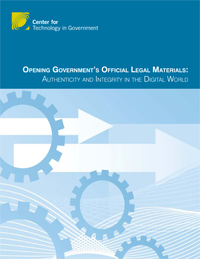UAlbany’s Center for Technology in Government Releases New Report with Recommendations for States on Providing Access to Electronic Legal Records
March 12, 2012
(518) 442-3892
The Center for Technology in Government at the University at Albany – SUNY has released a new report, Opening Government’s Official Legal Materials: Authenticity and Integrity in the Digital World. The report was written to help state legislatures and policy makers develop capability for providing electronic copies of government legal records such as laws, regulations, and court decisions that are as official and authentic as their traditional paper versions. This issue has risen in importance for many state legislatures due to the recent issuance of the Uniform Electronic Legal Material Act (UELMA), model draft legislation developed by the National Conference of Commissioners on Uniform State Laws.
 New software and Web-enabled technologies related to digital documents and records’ authenticity have the potential to provide multiple benefits to both government, citizens, and businesses. States anticipate being able to achieve costs savings, productivity gains, and greater government transparency and accountability. However, to carry out successful solutions, states will need a strategy that focuses on more than just the technical requirements.
New software and Web-enabled technologies related to digital documents and records’ authenticity have the potential to provide multiple benefits to both government, citizens, and businesses. States anticipate being able to achieve costs savings, productivity gains, and greater government transparency and accountability. However, to carry out successful solutions, states will need a strategy that focuses on more than just the technical requirements.
“CTG’s report goes beyond the procurement and technology challenges faced by states when publishing official electronic legal material. It addresses the considerable policy and managerial ramifications of creating and providing access to these materials,” said Theresa Pardo, director of CTG. “This new report provides guidance for states as they develop and implement UELMA-based laws in a manner that reflects their own priorities and unique conditions.”
“Entering the world of official electronic legal materials raises issues that are complex but not exclusive to this subject matter,” said Alan S. Kowlowitz, government fellow at CTG and author of the report. “In building their own plans and capabilities, state legislatures can utilize the experience and knowledge gathered from experts in electronic signature policy and use, electronic records preservation, open government, and public value.”
The report urges policy makers, legislators, and CIOs to consider the specific technical, managerial, fiscal, and policy and political challenges to designing and implementing an UELMA-based law. It presents a high-level overview of the challenges and issues involved and outlines some first steps toward ensuring that each state puts in place a strategy that responds to the specific interests and requirements of that state.
The report includes five recommendations to help guide state legislatures and policy makers through a comprehensive planning process:
- Find out how publication of and public access to electronic legal materials are presently handled within your state.
- Assess the readiness of your state’s IT communities to address the challenges of authentic legal material.
- Assess the public value of making official legal materials available
- Assess the costs and potential cost savings of implementing official electronic legal materials.
- Identify the policy, management, and technical issues of implementing official electronic legal materials and examine potential solutions or ways of addressing these issues in the context of your state.
The report is freely available for download
The mission of the Center for Technology in Government at the University at Albany is to foster public sector innovation, enhance capability, generate public value, and support good governance. We carry out this mission through applied research, knowledge sharing, and collaboration at the intersection of policy, management, and technology.
The University at Albany-SUNY has a broad mission of excellence in undergraduate and graduate education, life-enhancing research and scholarship, and a commitment to public service. A University at Albany education brings the world within reach to students through nine schools and colleges, and an honors college. A student body of more than 17,000 students has a global connection to more than 140,000 alumni. For more information about this internationally ranked institution, visit www.albany.edu. For UAlbany's extensive roster of faculty experts, visit www.albany.edu/news/experts.php.